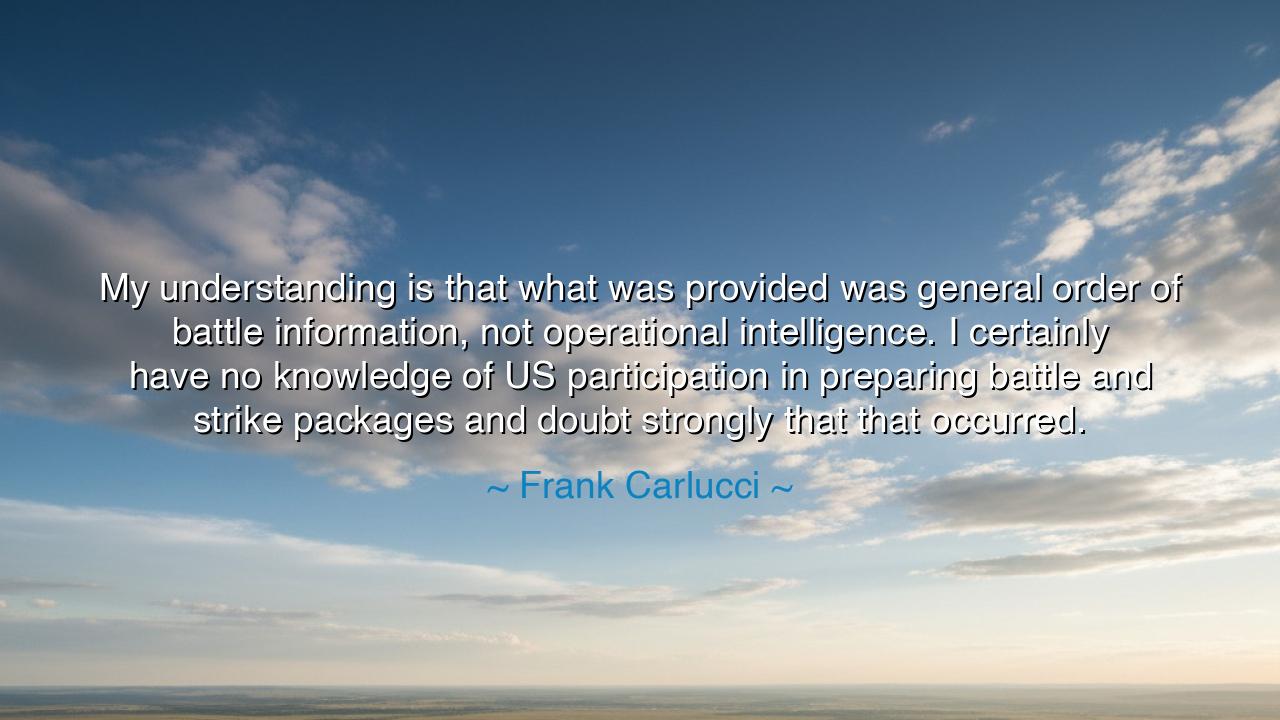
My understanding is that what was provided was general order of
My understanding is that what was provided was general order of battle information, not operational intelligence. I certainly have no knowledge of US participation in preparing battle and strike packages and doubt strongly that that occurred.






When Frank Carlucci stated, “My understanding is that what was provided was general order of battle information, not operational intelligence. I certainly have no knowledge of US participation in preparing battle and strike packages and doubt strongly that that occurred,” he was speaking as one who stood amid the shadows of statecraft and secrecy, where words carry the weight of nations and silence often bears the burden of truth. His tone—measured, restrained, and deliberate—reveals not only a defense of policy but a timeless struggle between responsibility and denial, between the public’s demand for truth and the government’s instinct for caution. In these words lies a meditation on power, knowledge, and the limits of human control within the machinery of war.
Carlucci, a former Secretary of Defense and statesman, was shaped by an age of uncertainty—the Cold War era, when the world was divided not merely by geography but by ideology and fear. His statement likely arose amid questions surrounding military involvement or intelligence sharing between allies and proxies. In such moments, every syllable becomes a shield. To distinguish “general order of battle information” from “operational intelligence” is not mere semantics; it is the language of the careful, the language of those who walk the razor’s edge between truth and discretion. He sought to affirm that the flow of knowledge had limits, that America’s hand—if extended—did not strike directly. Yet beneath his calm articulation lies the ancient truth: even when men act in the name of restraint, information is power, and power once shared can shape the destiny of nations.
In these words echoes the wisdom of the ancients. Consider Thucydides, who wrote of the Peloponnesian War and of leaders who justified their actions with measured rhetoric while empires trembled. He observed that the line between defense and aggression, between wisdom and deceit, often vanishes in the fog of war. Carlucci’s statement carries the same rhythm—a leader speaking through the veil of ambiguity, seeking to preserve the dignity of state while guarding against moral entanglement. The ancients would have recognized this tone, for it is the eternal voice of diplomacy, where every word is both a truth and a concealment, both a confession and a denial.
Yet there is also humility in Carlucci’s phrasing. “I certainly have no knowledge... and doubt strongly that that occurred.” These words show the frailty of even the most powerful among men. In vast systems of government and warfare, no single person holds all truth. Decisions ripple through layers of command, and actions born in secrecy may reach outcomes no one foresaw. Here, Carlucci’s statement becomes not just political—it becomes philosophical. It reminds us that in the great structures of human power, knowledge is fragmented, truth is elusive, and moral certainty is rare.
Let us then reflect on the deeper teaching buried within this moment of history: that clarity and conscience must walk hand in hand. When we speak of “orders of battle” and “operational intelligence,” we speak of lives—of soldiers, of civilians, of the unseen consequences that follow from a word whispered in a secure room. The lesson is not that power must be denied, but that it must be wielded with transparency of heart, for every hidden truth eventually casts its shadow upon the world. The ancients taught that a wise leader must see not only the outcome of action, but also the moral weight that each choice carries upon the soul.
From Carlucci’s words, we may learn a timeless discipline: to know the difference between what must be kept and what must be told. In the age of information, this balance is more vital than ever. Leaders, citizens, and seekers of truth alike must ask—does our silence protect, or does it deceive? Does our sharing enlighten, or does it endanger? These are not questions for politicians alone, but for every soul who holds power in any form, whether over knowledge, over people, or over the shaping of a single life.
Thus, let the listener remember: in the realm of power, truth must be honored, even when it must be guarded. To speak carefully is wise, but to forget the purpose of truth is ruin. The greatest leaders are not those who conceal most skillfully, but those who remember that even the smallest truth withheld can alter the fate of the innocent. So act always with the consciousness of consequence. For as Carlucci’s words remind us, power, intelligence, and restraint are threads of the same tapestry—and only through wisdom and integrity can that tapestry endure the storms of history.






AAdministratorAdministrator
Welcome, honored guests. Please leave a comment, we will respond soon